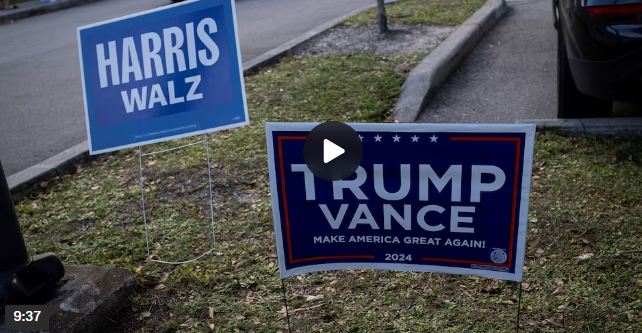WASHINGTON: Political polarization in this country is such that partisans look at each other with mutual incomprehension. Plenty of Vice President Kamala Harris’ supporters can’t fathom someone voting for former President Donald Trump, and vice versa.
The ABC News/Ipsos polling this cycle hasn’t been conducted to monotonously recite the score of the game, but to try to understand the concerns and motivations on each side.
Looking at the big picture, we continue to see three powerful factors in the country’s divisions: economic, demographic and cultural.
Economically, it’s hard to get ahead, but it’s harder still if you’re one of the nearly two-thirds of adults who don’t have a four-year college degree. Wealth and income gaps have grown dramatically and housing costs are brutal. Moderating inflation, after a 40-year-high, doesn’t mean the floodwaters have subsided; they’re just rising more slowly. Real median household income under President Joe Biden’s administration is down 0.7% from its high under Trump. The price of a dozen eggs is up 161%.
Signs are seen outside a polling station at Palm Beach County Library during early voting in the presidential election in West Palm Beach, Florida, Nov. 3, 2024.
Marco Bello/Reuters
MORE: Election stays close in final weekend with a dispirited electorate: Poll
Demographically, we witness growing diversity. The under-18 population is now a majority-minority. The population overall has gone from 80% white in 1980 to 58% white in the most recent data. When any group sees its traditional cultural dominance contracting — particularly when it’s also experiencing diminished economic opportunity — ingathering and resentment toward outgroups can occur.
Culturally, there are major crosscurrents. Americans won the constitutional right to same-sex marriage. Americans lost the constitutional right to abortion. You can buy recreational marijuana in 24 states. You can carry a concealed firearm without a permit in 29 states. From transgender rights to DEI initiatives, controversies rage. Shifts on each of these reassure one segment of the population while they deeply trouble another.
Consider the crosscurrents in the ABC News/Ipsos polling — 56% of Americans want the federal government to restore the constitutional right to abortion. An identical 56% of that polling favor mass deportation of immigrants. The latter has grown by 20 percentage points since 2016.
Demographic trends, in particular, have political impacts. The share of voters who are white has declined from 90% in 1976 to 67% in 2020, per exit polls. Democrats have won the popular vote in seven of the last eight presidential elections based on their support from the growing population of people of color.
People cast their ballots on the last day of early voting for the general election in Michigan at the Livingston Educational Service Agency in Howell, Michigan, Nov. 3, 2024.
Jeff Kowalsky/AFP via Getty Images
Nearly eight in 10 Republicans in ABC News/Ipsos polling are white. The party has struggled to appeal to members of racial and ethnic minority groups — a reason to watch the Hispanic voter closely on Election Day. As things stand, since 2000, Republicans have won white people by 12 to 20 points, while Democrats have won everyone else by 44 to 64 points.
We can drill down further: the GOP vote is based on vast support from non-college white people, especially non-college white men. And there are white evangelical Christians — Republican presidential candidates have won them by 50 to 62 points in available exit poll data since 2004, while losing everyone else by 13 to 28 points. Bloc voting gives these groups considerable clout.
To the current election, briefly: Trump supporters are deeply skeptical of the country’s direction and by extension the institutions that brought it to this place. They feel left behind; some are empowered by Trump’s norms-busting rhetoric. He encapsulates their grievances. Nearly six in 10 Trump supporters think the country’s best days are behind it. Nearly all, 98% – say the country is “seriously off on the wrong track.” They are eager to kick over the traces of the status quo.
In ABC News/Ipsos polling, Harris supporters reflect the more diverse Democratic coalition and a less dire outlook. More than seven in 10 of her supporters say the country’s best days are ahead. Half say the country’s seriously off on the wrong track — still a lot, but vastly fewer than among Trump supporters. Although the gender gap has looked typical, abortion access has been a mobilizing factor among women.
PHOTO: A supporter attends a rally by Democratic presidential nominee Vice President Kamala Harris, Nov. 3, 2024, in East Lansing, Mich., and a supporter attends a rally by Republican presidential candidate Donald Trump in Macon, Georgia, Nov. 3, 2024.
A supporter attends a rally by Democratic presidential nominee Vice President Kamala Harris, Nov. 3, 2024, in East Lansing, Mich., and a supporter attends by former President and Republican presidential candidate Donald Trump in Macon, Georgia, Nov. 3, 2024.
AP/Getty Images
MORE: Most voters ready to accept election results but doubt Trump will: Poll
Still, even among Harris’ own supporters, polling shows just more than a third say they’ve gotten better off financially under the administration in which she’s No. 2. She’s had trouble in her short campaign persuading people she’ll take the country in a new direction.
Against this background we’ve seen hot rhetoric, deep suspicion and fear for what’s ahead. Of Harris supporters, 96% don’t think Trump will accept the election outcome, while 59% of Trump supporters don’t think Harris will accept it. Half of the nation thinks Trump is a fascist. Among the other half, 87% are lined up to vote for him, according to polling.
Ultimately, for the third cycle straight, this election will come down to a choice between two fundamentally different visions of America and two fundamentally different leaders, in style and substance alike. We’ll learn soon which approach is more embraced in what is, by any measure, inexorably a changing country.

















